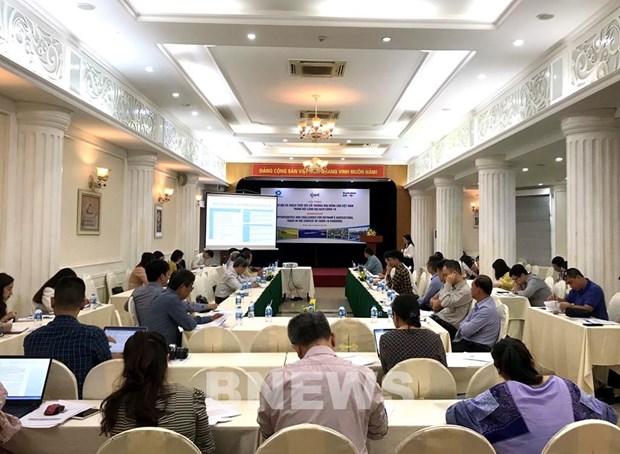COVID-19 crisis may be opportunity for Vietnam’s agricultural trade: Experts
The COVID-19 pandemic has rocked the global economy and created unprecedented trade uncertainty and challenges for all sectors, but from the crisis may come opportunity for Vietnam’s agricultural trade, experts have said.
 At the workshop (Photo: VNA)
At the workshop (Photo: VNA)At a workshop held by the Institute of Policy and Strategy for Agriculture and Rural Development (IPSARD) and the Australia - Vietnam Economic Reform Programme (Aus4Reform Programme), Do Lien Huong from IPSARD said that although the agricultural sector suffered a decline in agricultural trade last year, it maintained a trade surplus of 10 billion USD.
There are challenges for Vietnam’s agriculture since the country has no particular support policies for the sector while demand in traditional trade partners such as China and the US are falling.
“The pandemic highlighted shortcomings in the agricultural sector and imposed stringent requirements on uniform policies as well as production and cultivation methods,” Huong said.
She stressed that the agricultural sector could find new markets if changes are made in a timely manner.
According to Deputy Secretary General of the Vietnam Association of Seafood Exporters and Producers (VASEP) Nguyen Hoai Nam, the shipment of seafood in 2020 fell 1.9 percent year-on-year due to increasing input costs and labour shortages.
In the first quarter of 2021, however, seafood exports inched up 6.9 percent from the same time last year.
Nam said that Vietnamese firms may have opportunities to promote exports and gain greater market share in the time to come as large markets such as the US, Japan, and China are increasing imports while competitors like India and Thailand are struggling with spiralling pandemic outbreaks.
Regarding the production and trade of fruits and vegetables, Chairman of the Vietnam Fruit and Vegetable Association Nguyen Thanh Binh said production and shipments have fallen since 2019 as a result of the US - China trade war and COVID-19, but he believed they will bounce back this year.
It is necessary to promote production links and form a sustainable value chain to improve food safety, quarantine, and origin traceability, he suggested, adding that localities and businesses should focus on large-scale production and the application of advanced technologies and good practice standards such as VietGAP and GlobalGAP.
Other experts held that State agencies should provide businesses with full market information and raise awareness about import-export activities.
In addition to expanding markets and adjusting the export market structure, the State should also outline measures to stimulate the economy and support companies in production and business.
According to Director of the Legal Department at the Vietnam Chamber of Commerce and Industry, Dau Anh Tuan, Vietnamese enterprises expect support from the State, including exemptions from corporate income taxes, extensions on tax payments, and reductions or extensions on social security payments, among others./.












